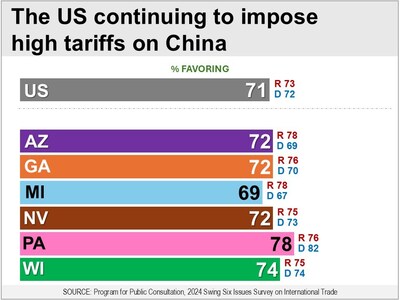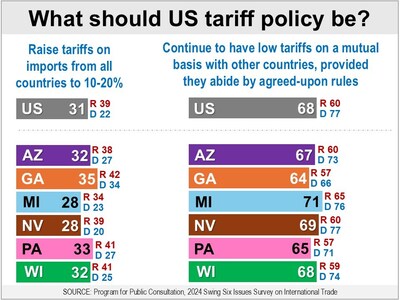
Cision PR Newswire
In Swing States Majorities of Rs and Ds Oppose Raising Tariffs on All Imports to 10-20 Percent

Prefer Keeping Low Tariffs With Countries that Abide by Trade Rules, While Keeping High Tariffs on China
COLLEGE PARK, Md., Oct. 3, 2024 /PRNewswire/ -- As major proposals to change US international trade policy have come into the discourse, a new public consultation survey finds bipartisan majorities of Americans in six swing states, as well as nationally, support the US continuing to have low tariffs with other countries on a mutual basis so long as they abide by agreed-upon rules, rather than raising all tariffs to 10-20 percent. At the same time, bipartisan majorities approve of the increased tariffs that have been imposed on China in response to their alleged violations of international trade rules.
This survey is the eighth in a series – the Swing Six Issue Surveys – being conducted in the run-up to the November election in Arizona, Georgia, Michigan, Nevada, Pennsylvania, and Wisconsin, and nationally, on major policy issues by the Program for Public Consultation at the University of Maryland. Unlike standard polls, respondents in a public consultation survey go through an online "policymaking simulation" in which they are provided briefings and arguments for and against each policy. Content is reviewed by experts on different sides to ensure accuracy and balance. All Americans are invited to go through the same policymaking simulation as the survey sample.
Director of the Program for Public Consultation, Steven Kull, comments, "While Americans do support the tariff increases targeted at China, bipartisan majorities oppose a tariff increase on imports from all countries. Large bipartisan majorities support the US continuing to be part of the international agreements for low tariffs within a rules-based system." [More Detailed Report]
Support for Continuing International Trade System of Low Tariffs
Respondents were informed that, since World War II, the US has been actively working to promote international trade through a system in which countries negotiate to lower their tariffs on a mutual basis, provided each country abides by agreed-upon rules. The US has such trade arrangements with almost all countries – through free trade agreements and the General Agreement on Trade and Tariffs. As a result, average tariffs globally have decreased from about 22% in the 1940's to about 2% today.
Bipartisan majorities in all swing states (80-85%) approve of the US working with other countries to continue this system, including majorities of Republicans (73-78%) and Democrats (86-93%). Nationally, 81% approve (Republicans 74%, Democrats 88%). [BAR GRAPH]
Opposition to Across-the-Board Tariffs of 10-20 Percent
Respondents evaluated a proposal to impose tariffs of 10-20 percent on imports from all countries, including arguments that these higher tariffs would: generate substantial government revenue and thus allow for reductions in taxes; and stimulate US manufacturing and lead to better-paying jobs. They also evaluated arguments against, that raising all tariffs would: violate US trade agreements and likely cause the US' biggest trading partners to retaliate with tariff increases; and raise consumer prices for everyone. Arguments on both sides were found convincing by bipartisan majorities.
Finally, asked which policy they prefer, less than half in all six swing states (28-35%) support the US raising tariffs on imports from all countries to 10-20 percent, including just 34-42% Republicans and 20-34% Democrats. Instead, large majorities prefer the US continuing to have low tariffs on a mutual basis with other countries, provided they abide by agreed-upon rules (64-71%), including majorities of Republicans (57-65%) and Democrats (66-77%). Nationally, 68% prefer continuing the current policy of low tariffs (Republicans 60%, Democrats 77%).
Support for High Tariffs on China
Respondents were informed that starting in 2018, in response to alleged violations of international trade rules by China, the US increased tariffs on Chinese products to an average of about 20 percent, and that China retaliated with similarly high tariffs on the US. Bipartisan majorities in every swing state favor the US continuing to impose such tariffs on Chinese imports (69-78%), including majorities of Republicans (75-78%) and Democrats (67-82%). Nationally, 71% are in favor, with no difference between Republicans (73%) and Democrats (72%).
Support for Labor and Environmental Standards in US Trade Deals
The US in its trade deal negotiations has been increasingly pushing for the inclusion of enforceable labor and environmental standards. Respondents evaluated arguments that such standards ensure that trade partners cannot get a competitive advantage by having significantly lower standards than the US. They also evaluated arguments against, including that the US imposing standards on other countries and including too many provisions in trade deals will slow down international trade, which would hurt everyone.
Asked whether the US should actively work to make agreements that include enforceable labor standards – including a prohibition on child labor and the right of workers to collectively bargain – bipartisan majorities are in favor in the swing states (81-87% ) including Republicans (79-85%) and Democrats (89-93%). Nationally, 82% are in favor (Republicans 77%, Democrats 90%). [BAR GRAPH]
Asked whether the US should actively work to make agreements that include enforceable environmental standards – which require countries to abide by environmental agreements they have signed, and not lower their standards to get a competitive edge – bipartisan majorities in the swing states are in favor (76-82%), including Republicans (70-76%) and Democrats (83-89%). Nationally, 78% are in favor (Republicans 72%, Democrats 86%). [BAR GRAPH]
About the Survey
The survey was fielded September 9-22, 2024 with 4,675 adults by the Program for Public Consultation at the University of Maryland's School of Public Policy, including approximately 600 in each state of Arizona, Georgia, Michigan, Nevada, Pennsylvania and Wisconsin, and 1,260 nationally. Samples were obtained from multiple online opt-in panels, including Cint, Dynata and Prodege. Sample collection and quality control was managed by QuantifyAI under the direction of the Program for Public Consultation. Samples were pre-stratified and weighted by age, race, gender, education, income, metro/non-metro, marital status, home ownership, and partisan affiliation (nationally and in some states) to match the general adult population. The survey was offered in both English and Spanish. The confidence interval for the national sample is +/- 3.1%, and for the state samples it ranges from +/- 4.5 to 4.6%.
- International Trade Questionnaire with Toplines, Crosstabs, and Methodology
- National and Six State Full Report
- Go Through the Policymaking Simulation
About the Program for Public Consultation
The Program for Public Consultation (PPC) at the University of Maryland's School of Public Policy, develops and conducts public consultation surveys, seeking to improve democratic governance by consulting representative samples of citizens on key public policy issues. It shares its findings with officials in government, the media, other academics, and the general public.
CONTACT: Ana Cobian
Ana.Cobian@wardcirclestrategies.com
![]() View original content to download multimedia:https://www.prnewswire.com/news-releases/in-swing-states-majorities-of-rs-and-ds-oppose-raising-tariffs-on-all-imports-to-10-20-percent-302265867.html
View original content to download multimedia:https://www.prnewswire.com/news-releases/in-swing-states-majorities-of-rs-and-ds-oppose-raising-tariffs-on-all-imports-to-10-20-percent-302265867.html
SOURCE Program for Public Consultation

NOTE: This content is not written by or endorsed by "WGNO", its advertisers, or Nexstar Media Inc.


